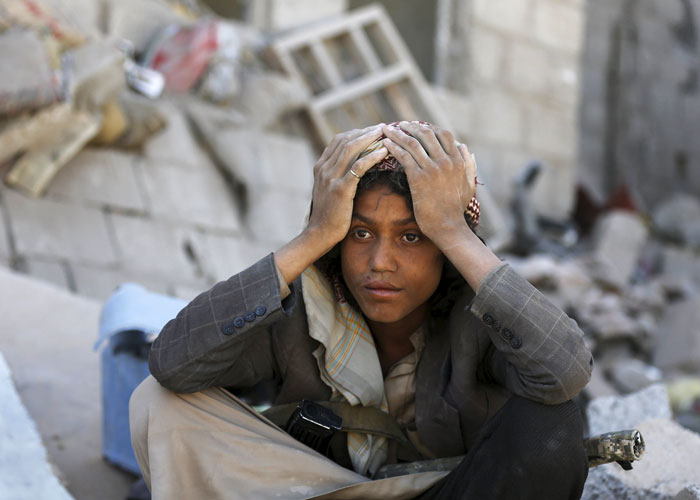Al-Sabah Al-yemeni
It is hard to overstate the human costs of Saudi Arabia’s war in Yemen. More than 10,000 people have died in the country since fighting began in late March 2015. An estimated 2 million Yemeni children are starving; the country is the site of the worst cholera outbreak in the world, with 200,000 known cases and 5,000 new ones every day. The United Nations estimates that 82 percent of the country’s population needs urgent humanitarian assistance.
Not all of this can be blamed on the Saudi-led coalition, which is aligned with the internationally recognized government. Their opponents, an Iranian-backed rebel group known as the Houthis, have killed civilians and blockaded cities. Yet the Saudis, whose jets have repeatedly bombed hospitals and whose warships have stopped numerous aid shipments from groups like Save the Children, deserve a huge share of the blame.
During a roundtable briefing with reporters Tuesday, I asked Saudi Foreign Minister Adel al-Jubeir about how he would justify the enormous human toll. His answer, delivered in the calmest of tones, managed to be both accurate and strikingly cynical.
“The humanitarian crisis in Yemen is a tragedy,” Jubeir told me. “We have been the largest donor of humanitarian assistance in the world, by far, to Yemen.”
This appears to be, in a very technical sense, true. The Saudi government has donated about $848 million in humanitarian aid since its war in Yemen began in late March 2015 per Saudi government figures. The UAE, which is part of a multinational coalition assisting the Saudi bombing campaign, is in second place (donating about $500 million in the past two years).
Yet this talking point is, on a more fundamental level, absurd.
Saudi Arabia and its allies have imposed a blockade on imports to Yemen both overseas and via air, only allowing the food and medicine they decide to let in. This blockade, combined with bombing raids targeting civilian infrastructure, is the key reason why the humanitarian situation is so dire.
“The unwarranted restrictions on the flow of commercial and humanitarian goods and services into Yemen and impeding distribution within the country are paralyzing a nation that for far too long has been a victim of war,” Idriss Jazairy, the UN special rapporteur on human rights and international sanctions, said in an April statement.
The cholera outbreak is an especially clear and grim example. Cholera is spread through dirty water; in January of last year, Saudi jets blew up the desalination plant serving the large city of Taiz, forcing people to turn to dirtier water. Cholera is fairly easy to treat with antibiotics; the Saudi blockade ensures that there’s a shortage, allowing the disease to spread.
So you can see why Jubeir claiming credit for funding humanitarian relief efforts in Yemen is so unconvincing. It’s like someone burning down your house, leaving a sack of cash on your doorstep, and then claiming they’ve done more to get you through the catastrophe than anyone else.
vox midea
خليك معنا
